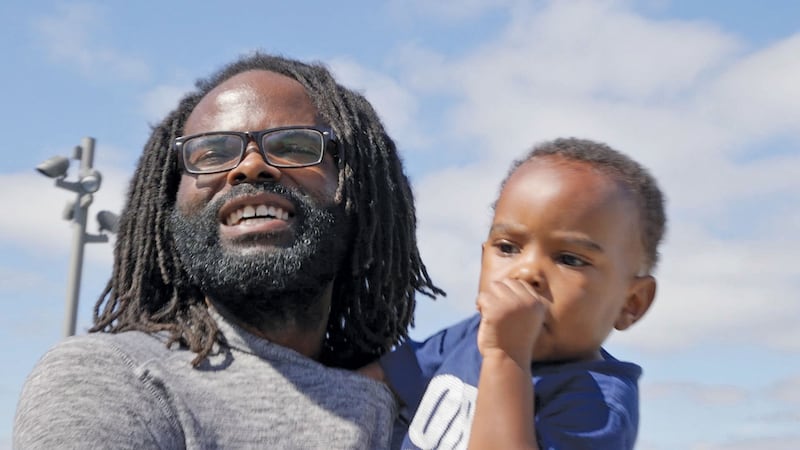After living in Portland for seven years, filmmaker Kalimah Abioto came to a realization—she didn't want her hometown, Memphis, Tenn., to become like her new city.
"I just saw the great change that was happening in Portland gentrification-wise and seeing just the beginning stages of that in Memphis and just being kind of worried," says Abioto, whose sisters are musician Amenta Abioto and photographer Intisar Abioto. "And kind of wondering how I could use film to maybe bring people together or galvanize people."
Black Genius is the resulting project. This week, the 34-minute documentary gets its Portland premiere as part of the First and the Last, an ongoing series dedicated to black femme and non-men new media artists. It will screen alongside Sight, Abioto's abstract sci-fi film about three girls with supernatural powers.
Abioto's most recent work borrows its name and format from Black Genius: African-American Solutions to African-American Problems, a 1999 collection of interviews with prominent thinkers and artists like Angela Davis and Spike Lee. Abioto's version of Black Genius is comprised of interviews with an array of black Memphis residents, spliced together with footage from that city's Southern Heritage Classic Parade last year. An interview with author Sheree Renée Thomas includes her reading her poem "Return Song, or Why I Went South" with airy rapture. The film also interviews Negro Terror, an anti-homophobia, anti-animal cruelty hardcore punk band, and Daniel Watson, a family-taught chef who runs Beneva Mayweather Foods, named after his grandmother.
For the most part, Abioto took a hands-off approach to making Black Genius. She spent months in her hometown interviewing artists, entrepreneurs, family friends, and strangers she met on the street. All of the interviews were open-ended. Abioto asked participants about their thoughts on Memphis, their personal ambitions or simply about their childhood. She's fond of quiet, slow-moving shots, including one that pans parade spectators, who stare into her camera, and another that silently glides over four women standing shoulder to shoulder on a front porch. Abioto often angles her camera so it looks up at her subjects, who tower above the viewer against bright blue skies.
But Abioto was also loosely pursuing a narrative, and it's a narrative that distinctly emerges—how to cultivate community when faced with the threat of gentrification.
Early in Black Genius, a community advocate identified as David stands in front of a freshly razed lot. "We have no one to speak for us, for our voices to be heard. It's like I said in the start, they taking everything from us. Before you know it, what we hold in our hearts is gone," he says. "We ain't going to get no help. Imma try my best to save my people, to save the upcoming youth, our future. That's what I got planned."
Black Genius is a fundamentally hopeful film that believes displacement is avoidable, and that there are more choices than gentrification or decay. "Seeing what has happened [in Portland]," Abioto says, "I can then go back to Memphis and be like, 'Hey, this is what's going on, maybe we can do something different.'"
Abioto's film is full of people who want to do something different. Rapper and high school football coach Jason "Da Hater" Harris wants the city's musicians to get more national attention. Singer and actress Cequita Monique talks about growing literal and intellectual gardens. In the beginning of the film, Abioto talks to Aaron Snowden, an Air Force veteran who bought a house in south Memphis to host artists' residencies and community gatherings. The day before Abioto interviewed Snowden, he also opened a neighborhood dog park. "That's a milestone, believe it or not," he says as he looks away from the camera with a slight smile.
It's that kind of everyday beauty that Black Genius seeks to amplify. "Memphis has its problems, but ultimately, the people are what make it a great place and make it have its soul," says Abioto. "I wanted to capture that in some way, and I still feel like I'm not all the way done."
That philosophy is perhaps the deepest way Abioto's Black Genius was inspired by the interview collection it's named after. It searches for multiple answers rather than settling on a single solution.
"[It's] not a thing that you have to be born with, this genius," says Abioto. "No, it's a communal thing. Everybody can tap into that if they choose to, and particularly if they choose to share that genius."
In that way, Abioto views her camera as more of a sacrificial offer than a personal platform. "As one person, I might not have all the ideas and solutions," she says. "But talking to people about it, getting their ideas, maybe yeah, there can be other options than gentrification."
SEE IT: Black Genius and Sight screen at Paragon Arts Gallery, 815 N Killingsworth St., thefirstandthelast.squarespace.com, on Friday, July 27. 6 pm. Free.
